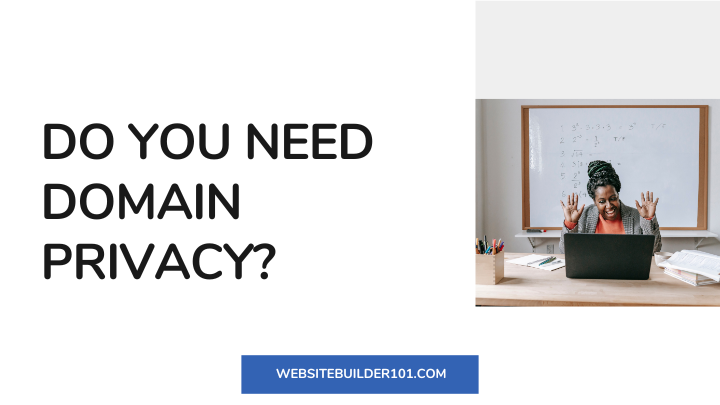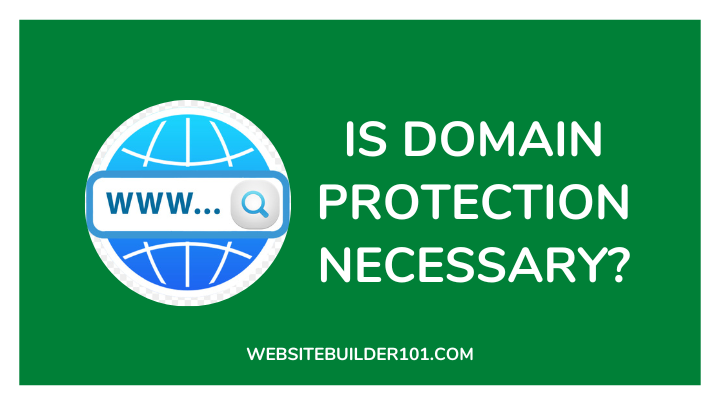Domain protection is necessary for any website. It ensures that your domain name, content, and other assets are safe from malicious individuals who could otherwise use them for their own gain.
Domain protection is one way to ensure your online presence remains secure in the face of the ever-increasing threat of cyberattacks in today’s day and age.
This article will discuss why it is necessary for you, as a website owner, to protect your domains. It’ll also help you decide whether you can do without this protection.
What is domain protection?
Domain protection is a service that masks your personal information from public view.
It works by replacing your contact information with the name, and details of a third-party company that acts as an intermediary between you and any potential website visitor.
That way, if anyone looks up the domain registration records for your website or blog, they will only see the information associated with the third-party company instead of your personal information.
Domain protection is a great way to ensure that your data remains private while allowing you to register and maintain your domain name.
It also keeps spammers from using automated software to harvest your contact information for marketing or other purposes.
Is domain privacy protection necessary?

The answer is yes.
When you register your domain, your personal information, including your name, phone number, email address, and physical address, is stored in the WHOIS (Who is responsible for this domain) directory.
This directory aims to help domain name registration companies identify every registered domain and notify other users of them.
Also, if you want to buy a domain name that has already been registered, you will be able to contact the domain owner directly to ask if they are willing to sell.
Why is domain privacy protection necessary?
1. Minimize malicious activities
Domain privacy protection helps prevent hackers from stealing your credentials and using your personal information for malicious activities.
It also helps you avoid unsolicited calls and other forms of cyber-attacks.
2. Protect your identity
Domain privacy protection helps to hide your details like name, address, contact number, etc., from public view.
This prevents identity theft as well as data mining and phishing attempts.
3. Manage reputation
Domain privacy protection protects you from online reputation attacks.
It also prevents spamming, as malicious parties cannot find out who owns the domain and thus cannot send spam emails or messages to you.
4. Protect against cyberbullying
You can protect yourself against cyberbullying and other malicious attempts by making your contact information private. You will also protect your business from similar threats.
Can you make your domain information private?
Yes, you can.
Making your domain name private has many benefits (not limited to those listed above). Now let’s see the steps you can take to secure your domain and personal information.
How to make your domain information private
1. Purchase privacy protection for your domain name with your registrar. Most registrars like GoDaddy and Namecheap already offer this service, which will help protect the information associated with your domain.
So contact your domain registrar to know how you can access this feature.
2. Use a P.O. Box or mailbox service as your mailing address when registering with the WHOIS database. That way, your physical address will be hidden from public view.
3. Request that your registrar hide your personal information from the WHOIS database. Many registrars will do this for you, and it will keep your contact information hidden from anyone who searches for your domain name.
4. Use a proxy or third-party privacy service to hide your personal information from the WHOIS database. These services act as an intermediary between you and the WHOIS database and provide an additional layer of security. So it’s worth considering.
5. Make sure your hosting provider uses domain privacy protection. The reason is that not all hosting companies may offer this service. So check before signing up on any domain registrar site.
6. Lock down your domain records. This will add an extra layer of security to your domain name and ensure that your personal information is kept private. For instance, if you’re using Google domains, you can lock it by following these steps:
- Sign into your Google domains account
- Click on your domain name
- Open menu
- Select registration settings
- Scroll down the page till you find “Domain lock”
- Toggle the lock domain feature to protect your domain and your changes will be saved automatically.
7. Monitor your domain name regularly for any changes or unauthorized access. To do this, use a strong password with a combination of numbers, lower- and upper-case alphabets, and symbols.
That way, hackers will have difficulty gaining access to your domain’s admin panel.
FAQs
Is domain protection privacy for everyone?
Yes, it is. Domain privacy companies provide website owners with a way to protect their personal information from being publicly displayed in the WHOIS database.
Can you add domain protection later?
Yes, you can add it after registering your domain name.
Most domain registrars offer different options for protecting your domain from unauthorized transfers or changes to nameservers.
If you did not enable the protection while buying your domain, you could still request this feature when you’re ready.
In addition, you can opt for extra services such as Whois Privacy Protection, Domain Lock, and Theft Protection which can help protect your domain from potential threats.
How much does domain protection cost?
The cost depends on the domain registrar provider or product you choose.
Generally, domain protection services cost around $3.00 to $20 per year.
Keep in mind that if you’re buying a domain name that cost over $100, domain registrars like Namecheap will ask you to pay for domain protection together with your purchase. This isn’t optional and can amount to $103 to $120 altogether.
Conclusion
Domain protection is a necessary security measure for businesses of any size. It allows you to protect your brand from cybercriminals who could hijack or misuse your domains to harm your business.
Domain protection helps businesses comply with relevant laws and regulations, such as GDPR. Therefore, ensuring that your business takes the necessary steps to protect its domains and uphold its online reputation is important.
Overall, is domain protection necessary, or can you do without it? Yes, it is necessary, and you should prioritize this feature for your safety and your business.
Thanks for reading.
You can also visit WebsiteBuilder101 to find more helpful guides like this.
